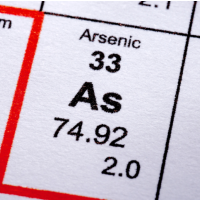In Rare Move, State Suspends Operations at L.A.-Area Hazardous Waste Facility

A battery-recycling plant in an industrial section of Los Angeles County, operating under a temporary permit for 17 years, was temporarily shut down by the state after reports of arsenic contamination in the vicinity, probably from corroded pipelines, put 110,000 people in the area at increased risk of cancer.
It is the first time since 1997 that the state has suspended the operating permit of a major hazardous waste recycler. But it is not unusual for facilities to operate without permits. Nearly 20% of the state’s 118 hazardous waste sites (pdf) don’t have a current one.
Exide Technologies’ plant in Vernon recycles thousands of batteries a day to recover lead and polypropylene. It has been the constant subject of complaint, and state-ordered corrective action, over lead emissions for years. But arsenic complaints are relatively new.
The state Department of Toxic Substances Control (DTSC) suspended operations at the facility weeks after the South Coast Air Quality Management District (AQMD) ordered the company to reduce arsenic emissions and begin an outreach program to the community explaining what it was doing to them.
They already seemed to have an inkling. Nearby Maywood Councilman Felipe Aguirre told the Los Angeles Times he and others in the community had complained for years about toxic pollution from the facility. “It is long overdue,” he said of the closure. “They didn’t do a damn thing.”
The AQMD had been looking for the source of high levels of arsenic it detected in the area since 2010, but it took two years to point a finger at Exide for what it considered an elevated risk of cancer to nearby residents.
The state’s Toxic Hot Spots program requires sources of pollution to notify the public if the calculated health risk to humans is 10 in 1 million or more. If the risk is 25 in 1 million or more, the facility has three years to come up with a solution.
Exide’s calculated risk is 156 in 1 million. And that’s just from arsenic belching from smokestacks. Now, soil contamination is in the mix.
The DTSC ordered the shutdown after recent reports showed that the plant’s “underground hazardous waste-degraded pipelines are out of compliance with California's stringent hazardous waste requirements, and are releasing toxic metal-bearing water and pose a risk to the environment.”
It is not known how long the facility will be closed.
–Ken Broder
To Learn More:
California Suspends Operations at Vernon Battery Recycler (by Jessica Garrison and Kim Christensen, Los Angeles Times)
California Shuts Down Hazardous Battery Recycler (by Tracie Cone, Associated Press)
110,000 in Los Angeles Area Exposed to Arsenic Emissions from Battery Recycling Plant (by Ken Broder, AllGov California)
118 Permitted Hazardous Waste Facilities in California (Department of Toxic Substances Control) (pdf)
Order to Suspend Operations (DTSC Director Debbie Raphael) (pdf)
- Top Stories
- Controversies
- Where is the Money Going?
- California and the Nation
- Appointments and Resignations
- Unusual News
- Latest News
- California Forbids U.S. Immigration Agents from Pretending to be Police
- California Lawmakers Urged to Strip “Self-Dealing” Tax Board of Its Duties
- Big Oil’s Grip on California
- Santa Cruz Police See Homeland Security Betrayal in Use of Gang Roundup as Cover for Immigration Raid
- Oil Companies Face Deadline to Stop Polluting California Groundwater





